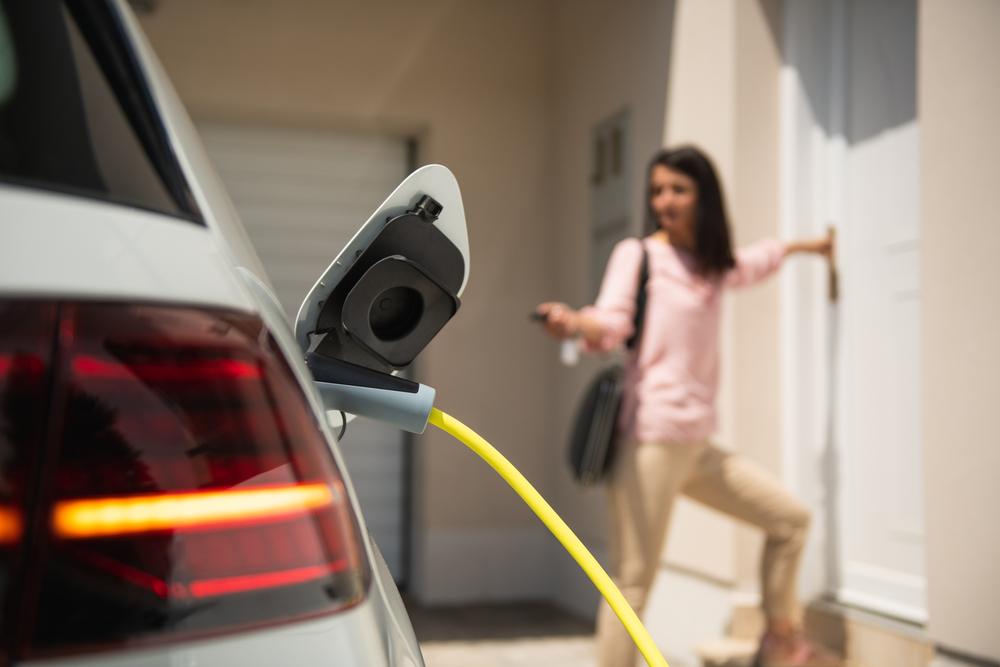Charging Electric Vehicles at Home – What’s the risk?

Electric vehicles (EV) are gaining traction in the U.S. According to industry data, there will be almost 100 EVs in production by the end of 2024. The ability to refuel an electric vehicle at home is one of the major benefits of an EV, according to a recent J.D. Power study, the majority of EV owners (88%) do most of their vehicle charging at home.
However, putting a 240 (level 2) charger in your garage can also increase your risk of a fire so it is important to make sure have it professionally installed. We thought it might be a good idea to have a quick look at EV charging stations and how to mitigate any fire risk they may present.
Charging stations explained
There are three types of charging stations, but most EV owners would only use a level 1 or level 2 charger at home. Here is a quick overview of the various charging stations:
Level 1- A level one is simply a 120 Volt outlet which is the standard outlet in your home. Your EV will have a cable that can be plugged into a standard wall outlet. The major issue with a level one charging station is the slowness of the charge. It will charge about four miles an hour so even after charging for 8 hours you will only have 32 miles of juice.
Level 2 – This type of charging station runs on 240-volt outlet, like the ones for a dryer. A level two charger should be professionally installed and will charge your vehicle 4 to 7 times faster than a level 1 charger depending on the charger and your vehicle.
In a recent press release Mercury Insurance Vice President of Property Claims Christopher O’Rourke advises owners to make sure you use a proper charger and have it professionally installed.
“Consider the experience of an individual who rigged scores of battery packs together to charge a car, it didn’t end well,” O’Rourke says. “The battery packs overheated and burned down the garage. Fortunately for this person, the homeowners insurance claim was covered. Nevertheless, it’s best to have an electrician handle any EV charging station installations,” said O’Rourke.
Level 3 – These are also called Fast Chargers and are mainly used in commercial and industrial settings, due to the type of equipment that is needed as well as the cost. These types of chargers are rarely installed in a home.
Insurance and EV chargers
When it comes to EV chargers, they may fall under your homeowners insurance or your car insurance depending on the type of charger you have as well as what peril damaged or destroyed it.
O’Rourke recommends carrying comprehensive auto insurance to make sure any damage may be covered. According to the Mercury Insurance press release, your charger may or may not be covered by a standard homeowners insurance.
“While damage to a home may be covered, the charger itself may not be. A standard homeowners insurance policy excludes coverage related to motor vehicles, which means losses to vehicles; trailers, campers or other equipment towed by a vehicle; and vehicle equipment, accessories and parts are not covered,” says the Mercury Insurance press release.
“Hard-wired charging stations are usually considered part of your dwelling and thus the station will likely be covered depending upon the type and cause of a loss,” O’Rourke said in the press release. “Portable chargers, on the other hand, may be considered vehicle equipment, so it’s a good idea to make sure to have adequate auto insurance coverage as well.”
If your home’s wiring ends up causing an issue that results in your charger catching on fire, your homeowners insurance should cover the damage. In order to fully protect your charger, you should be carrying both homeowners insurance and comprehensive auto coverage.
Stay informed about battery recalls
While EV’s are becoming more and more mainstream, they are still a fairly new technology when compared to a gas-powered car so it pays to stay on top of battery related issues with an EV. A recent recall of the Chevrolet Bolt is an excellent example of why it pays to make sure you are aware of any recalls or battery related issues. “The fact is all-electric vehicles are still relatively new to the marketplace, so automakers are still perfecting them,” O’Rourke says in the press release. “EV owners need to do their due diligence and make sure they’re properly educated about their manufacturer’s recommendations for proper charging.”
